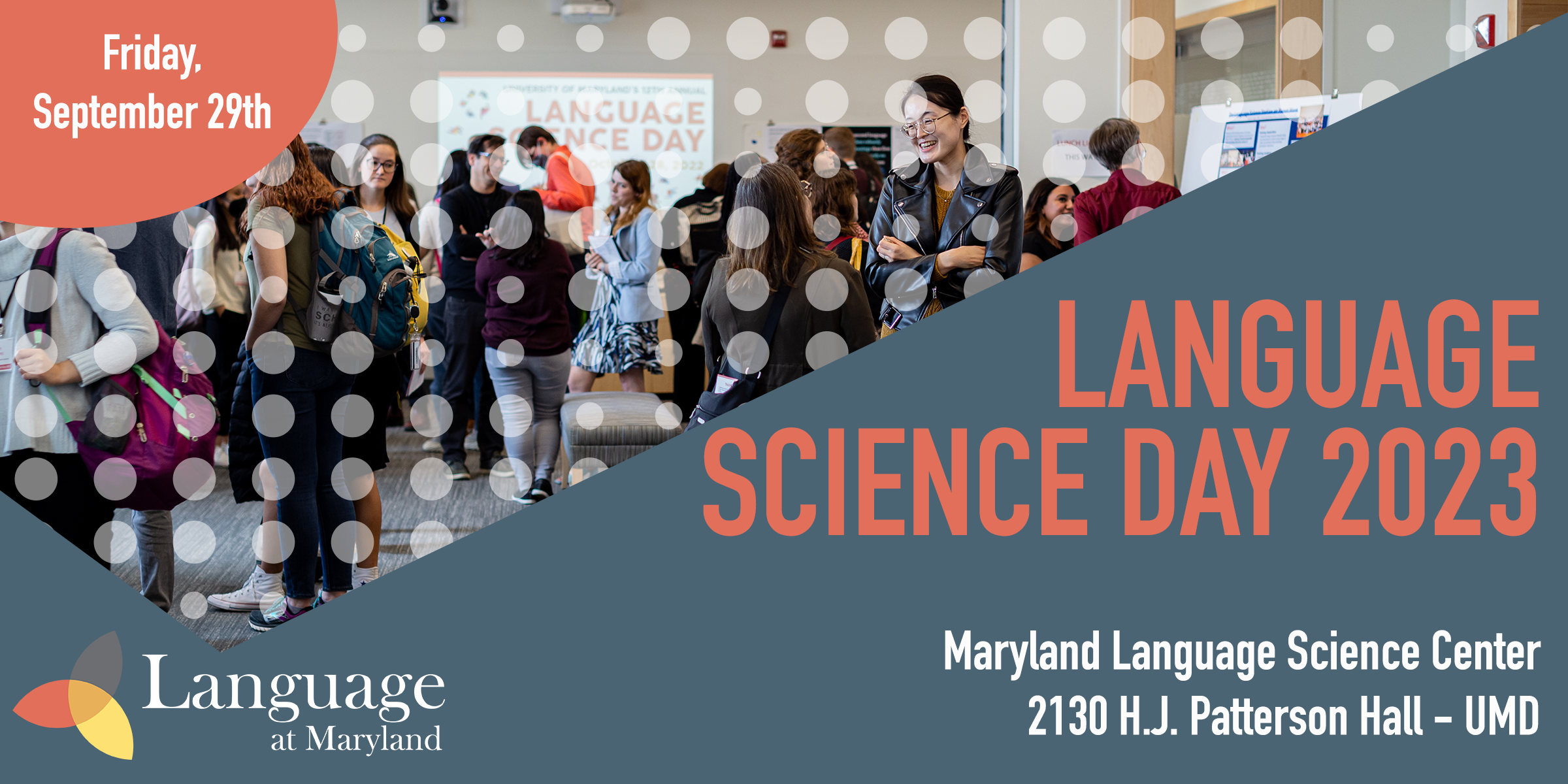Language Science Day 2023

Language Science Day 2023
The 13th annual Language Science Day is scheduled for Friday, September 29, 2023, 12-5pm.
Language Science Day (LSD) is a signature annual event for Maryland's language science community, bringing together around 150 students and faculty from across the university and affiliated centers. Participants get to know their fellow language scientists, exchange ideas, showcase their research, and discover opportunities for training or collaboration.
Schedule
All rooms are in H.J. Patterson Hall. The only wheelchair-accessible entrance to the building is on the parking lot side, the door furthest to the west (i.e. closest to the Health Center).
12:00 - 1:00 pm: Registration and Lunch, Language Science Center (Room 2130)
1:15 - 2:00 pm: Breakout sessions, Rooms 2114, 2118, 2123
2:10 - 3:45 pm: Poster sessions, Language Science Center (Room 2130)
4:00 - 5:00 pm: Quest to Save Language Science
5:00 - 6:00 pm: Happy Hour, Language Science Center (Room 2130)
Lightning Talks
We will have breakout sessions anchored by a few lightning talks (3-5 minutes each), followed by open discussion. Anyone is welcome to present a lightning talk, including faculty, postdocs, grad students, research staff, and undergrads. We invite two types of talks:
- Hot takes. Give us your perspective on a question or controversy that's hot in your field. You don't necessarily have to have active research on the topic--all you need is an opinion! The goal of this is for everyone to learn more about what researchers in different fields care about and argue about.
- Hot new findings. Tell us about a cool new finding from your research. Keep it simple: what was the question, what did you find, and why does it matter?
Breakout session #1 (HJP 2123)
For goodness' sake, consider strategies!
David Martinez
Why Large Language Models like ChatGPT should be called Muppet Models
Jordan L Boyd-Graber
Representation Matters: The Importance of Diverse Samples in Developmental Research
Ellie Taylor
Talk the Talk: Building Academic Language for Multilingual Literacy Learners
Maggie Peterson, Shannon Kane, and Loren Jones
Bilingual Code-Switches Boost Attention and Memory
Lauren Salig
Breakout session #2 (HJP 2118)
Does bilingual advantage exist? Views from developmental science and developmental cognitive neuroscience perspectives
Gavkhar Abdurokhmonova
Generative AI and Sociolects
Sandra Sandoval
Place-based Plurilingual Education
Kellie Rolstad
The Black Languages Research Group: What We Do and Why It Matters
Monica Obiri-Yeboah, Taylor Lewis, and Shenika Hankerson
Sensitivity to Statistical Regularities in Writing Systems
Jinglei Ren
Breakout session #3 (HJP 2114)
Can neurophysiology tell us about comprehension in real-time?
Donald J Bolger and Benjamin Rickles
Changing the way we treat childhood stuttering
Nan Ratner
Think Twice About Using ChatGPT: What Large Language Models Can & Can’t Contribute to Language Science Research
Sathvik Nair
Maryland’s Blueprint and Multilingual Learners' Success: Recommendations vs. Practicalities vs. Necessities
Drew S. Fagan
Posters
Session 1 (2:10-2:55)
Targeted Neuroplasticity Training to Enhance Language Learning
Nick Pandza, Polly O'Rourke, Stefanie Kuchinsky, Val Karuzis, Meghan Hersh, David Martinez, Alison Tseng, Mike Johns, Ian Phillips, Regina Calloway, Sarah McConnell
Does Bilingual Exposure Protect against SES Disparities in Selective Auditory Attention? A fMRI Study in Young Children
Gavkhar Abdurokhmonova, Ellie K. Taylor, S. Alexa McDorman, Junaid S. Merchant, Rachel R. Romeo
Why do some late talkers recover? A focused NIDCD initiative
Carly Rosvold, Allison Godsey, Avery Vess
Studying the human language faculty through child language development
Jack Yuanfan Ying, Imane Bou-Saboun, Cassandra Caragine, Allison Dods, Nathalie Fernandez, Katherine Gandolfo Howitt, Lydia Quevedo, Elizabeth Swanson, Tara Mease, Valentine Hacquard, Jeffrey Lidz, Alexander Williams
Can we improve communication between autistic and non-autistic people?
Shevaun Lewis, Allison Dods
Utilizing an AI Tool in Screening Primary Studies for Meta Research
Yazhuo Quan, Tetiana Tytko, Bronson Hui
Applicant Writership Identity in Anti-Racist Education Admissions
Rasha Alkhateeb, Katie Coogan, Loren Jones, Alison Jovanovic, Alejandro Pérez
The ATLAS Initiative
Connie DiJohnson, Miranda Abadir
Lectia! Demo
Connie DiJohnson, Miranda Abadir
Session 2 (3:00-3:45)
The Language Science Station at Planet Word
Charlotte Vaughn, Stella Huang
Cognitive Aptitude Assessments for Foreign Language Learning, Computer Language Learning, and Cybersecurity
Nick B Pandza, Meredith Hughes, Susan Campbell
Just Keep Swimming: Introducing the LEAD Lab Using the Family-Inspired Neural Synchrony Project
Alexandra Haralanova, Ellen C. Roche, Gavkhar Abdurokhmonova, Ellie K. Taylor, Abria Simmons, Christopher Metzler, Eliza A. Thompson, Elizabeth Redcay, Haoming Cai, Alexus G. Ramirez, S. Alexa McDorman, Victoria A. Terry, Nicole M. Ostria l, Fatimaria Rosales-Lima, N. Fatou Sall, Rachel R. Romeo
Recent findings from the UMD dog lab
Abby Poulton, RaeAnn Carpenter, Megan Baranowsky, Tate Yuen, Hannah Burchard, Sophia Li, Nithya Doodi, Sasha Sweat, Rochelle Newman
Why we all got into studying production
Colin Phillips, Rosa Lee, Katherine Howitt, London Dixon, Utku Turk, Allison Dods, Sathvik Nair, Sebastian Mancha, Tal Ness, Allison Macdonald
Eye-tracking research in SLA
Jon Malone, Tetiana Tytko, Hatice Ozata, Mona Alsalmi
Phonological representation and processing in Chinese-English bilingual adults
Nan Zhang
Revisiting the psychometric properties of the metacognitive awareness listening questionnaire
Ruirui Jia, Bronson Hui
Cognitive Set-Shifting in Conversational Discourse
Avery Vess, Kelly Marshall, Jared Novick, and Bob Slevc

